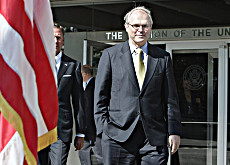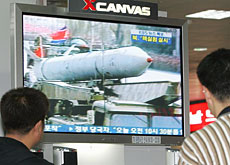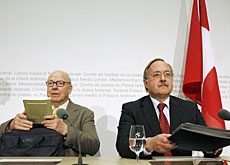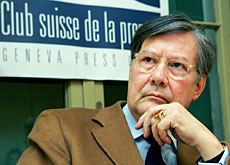Geneva talks end in North Korea nuclear deal

The United States says North Korea has agreed to declare and disable its nuclear programmes by the end of the year paving the way for a six-nation meeting this month.
The deal came during two-days of talks between top US and North Korean negotiators in the Swiss city of Geneva.
“North Korea will provide a full declaration of all their nuclear programmes and will disable their nuclear programmes by the end of 2007,” said US Assistant Secretary of State Christopher Hill on Sunday.
Hill thanked Switzerland for providing the setting for the negotiations – a venue reportedly proposed by the Pyongyang government.
The Swiss foreign ministry welcomed the announcement.
“The declarations of US negotiator Hill are reasons for optimism,” foreign ministry spokesman Lars Knuchel told swissinfo.
He added that Switzerland was dedicated to promote efforts of non-proliferation of nuclear weapons and welcomed moves to find a solution through diplomatic channels.
North Korea’s top nuclear envoy Kim Kye-gwan later said separately his delegation was pleased with the outcome of the talks.
“We showed clear willingness to declare and dismantle all nuclear facilities,” he said.
Improve relations
Hill said the meetings had been “very good and very substantive” and would help improve chances of a successful six-nation meeting later this month in China with Japan, Russia and South Korea.
The talks are aimed at ending the North’s nuclear weapons programme and improving relations between North Korea and other countries.
Hill said Sunday’s agreement included uranium enrichment programmes, which Washington fears could be used to make nuclear weapons.
However, he declined to say whether the disablement would include more than the plutonium-producing nuclear reactor in Yongbyon, which North Korea shut down in July.
“We have to work out some of the details on that,” Hill told reporters. “We will have a declaration in time to disable what needs to be disabled.”
Flurry
The meeting in Geneva was part of a flurry of “working group” sessions called for in February’s six-nation accord in which North Korea agreed to disable its plutonium-producing nuclear reactor and declare and eventually dismantle all its nuclear activities.
In exchange, the economically struggling North will receive oil and other aid. The US, as part of the agreement, promised to begin the process of removing the country from the terrorism list and work toward full diplomatic relations.
North Korea has already received 50,000 tons of heavy fuel oil from Seoul in return for the shutdown of its Yongbyon reactor in July.
The country will eventually get further energy or other aid equivalent to 950,000 tons of heavy fuel oil in return for irreversibly disabling the reactor and ending all its nuclear programmes, but has yet to set a date by when it will disable its nuclear facilities.
Years of tension and deadlock over North Korea’s nuclear programmes – which peaked with the country’s nuclear test last October – have started to ease in recent months as the talks have made progress.
swissinfo with agencies
The Nuclear Non-Proliferation Treaty (NPT) aimed at limting the spread of nuclear weapons opened for signature in 1968 and cam into force in 1970. But it does not ban the use of nuclear power for peaceful means.
There are currently 189 states party to the treaty, making it the most universal international agreement.
Among the nuclear power are UN Security Council members US, Britain, Russia, France and China.
India and Paskistan possess and have openly tested nuclear bombs, while Israel has not officially declard its nuclear weapons programme.
North Korea initially ratified the treaty and later withdrew. In October 2006 Pyongyang became the eighth nation to test nuclear weapons triggering an international crisis.
Switzerland signed in 1977.
2002: North Korea expels International Atomic Energy Agency (IAEA) inspectors from its territory.
2003: Pyongyang withdraws from the nuclear non-proliferation treaty (NPT).
2004: Negotiations fail with China, North Korea, South Korea, the US, Japan and Russia.
2006: North Korea carries out a long-range missile test. In response the UN Security Council imposes sanctions.
2006: In October North Korea carries out its first nuclear test, making it the eighth nuclear power.

In compliance with the JTI standards
More: SWI swissinfo.ch certified by the Journalism Trust Initiative



You can find an overview of ongoing debates with our journalists here. Please join us!
If you want to start a conversation about a topic raised in this article or want to report factual errors, email us at english@swissinfo.ch.